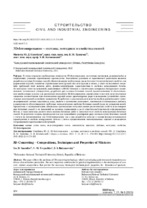| dc.contributor.author | Самуйлов, Ю. Д. | |
| dc.contributor.author | Трепачко, В. М. | |
| dc.contributor.author | Батяновский, Э. И. | |
| dc.coverage.spatial | Минск | ru |
| dc.date.accessioned | 2022-11-11T10:51:24Z | |
| dc.date.available | 2022-11-11T10:51:24Z | |
| dc.date.issued | 2022 | |
| dc.identifier.citation | Самуйлов, Ю. Д. 3D-бетонирование – составы, методики и свойства смесей = 3D-Concreting – Compositions, Techniques and Properties of Mixtures / Ю. Д. Самуйлов, В. М. Трепачко, Э. И. Батяновский // Наука и техника. – 2022. – № 5. – С. 374-385. | ru |
| dc.identifier.uri | https://rep.bntu.by/handle/data/122350 | |
| dc.description.abstract | В статье отражена проблематика технологии 3D-бетонирования, достаточно интенсивно развивающейся в современных условиях строительного производства. Важнейшим условием ее практической реализации является разработка составов бетонных смесей, обеспечивающих необходимые реологические (технологические) свойства для формования изделий, элементов строительных конструкций или конструкции в целом, а также позволяющих сохранять требуемый темп ведения работ, физико-механические характеристики и свойства затвердевшего бетона. На начальном этапе исследований, выполненных в НИИЛ бетонов и строительных материалов Белорусского национального технического университета, разработан ряд составов бетонных смесей, предназначенных и обеспечивающих необходимые условия для реализации технологии 3D-бетонирования самонесущих и несущих конструктивных элементов соответственно при изготовлении изделий малых архитектурных форм и возведении (устройстве) строительных конструкций различного назначения. Разработана и реализована методология подбора рационального гранулометрического состава заполнителя, вида, свойств и количества связующего, химических и минеральных добавок, в совокупности обеспечивающих требуемые технологические свойства бетонных смесей после их затворения водой. Предложены и экспериментально обоснованы оригинальные методики оценки реологических свойств водозатворенных бетонных смесей и их изменений во времени, приводящих к росту пластической прочности отформованного бетона, а также методика расчета темпа ведения бетонных работ в зависимости от свойств используемых бетонных смесей. В результате созданы предпосылки как для дальнейшего расширения ряда составов сухих бетонных смесей с учетом их предназначения для 3D-бетонирования, так и для разработки методик и оценки физико-механических характеристик и свойств затвердевшего бетона с учетом предназначения изготавливаемых изделий и возводимых (устраиваемых) строительных конструкций. | ru |
| dc.language.iso | ru | ru |
| dc.publisher | БНТУ | ru |
| dc.title | 3D-бетонирование – составы, методики и свойства смесей | ru |
| dc.title.alternative | 3D-Concreting – Compositions, Techniques and Properties of Mixtures | ru |
| dc.type | Article | ru |
| dc.identifier.doi | 10.21122/2227-1031-2022-21-5-374-385 | |
| local.description.annotation | The paper reflects the problems of 3D-concreting technology, which is developing quite intensively in modern conditions of construction production. The most important condition for its practical implementation is the development of concrete mixture compositions that provide the necessary rheological (technological) properties for formation of products, elements of building structures or the structure as a whole, as well as providing the required pace of work and physical and mechanical characteristics and properties of the hardened concrete. At the initial stage of research carried out in the Research and Testing Laboratory of Concrete and Building Materials of the Belarusian National Technical University a number of concrete mixtures compositions were developed that are designed and provide the necessary conditions for the implementation of 3D-concreting of self-supporting and load-bearing structural elements respectively, in the manufacture of products of small architectural forms and the erection (arrangement) of building structures for various purposes. A methodology has been developed and implemented for the selection of a rational granulometric composition of aggregate, type, properties and amount of binder, chemical and mineral additives, together providing the required technological properties of concrete mixtures after they have been mixed with water. Original methods for assessing the rheological properties of water-soluble concrete mixtures and their changes over time, leading to an increase in the plastic strength of molded concrete, as well as a method for calculating the rate of concrete work depending on the properties of the concrete mixtures used, are proposed and experimentally substantiated. As a result, prerequisites have been created for further expansion of a number of compositions of dry concrete mixes taking into account their purpose for 3D-concreting, and for developing methods and evaluating the physical and mechanical characteristics and properties of hardened concrete, taking into consideration the purpose of manufactured products and erected (arranged) building structures. | ru |

